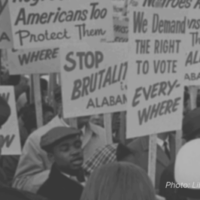A second unionization effort at an Amazon sortation facility, LDJ5, on Staten Island in New York has come up short, with the independent Amazon Labor Union (ALU) receiving only 380 votes out of a possible estimated 1,600 eligible employees.
The vote tallied Monday by the National Labor Relations Board (NLRB) means that the LDJ5 campus will not join a neighboring Staten Island warehouse, JFK8, in becoming the first set of employees to negotiate a union contract with Amazon in its history. The e-commerce giant became the largest apparel retailer in the United States during the pandemic and is expected to achieve 73 billion dollars in apparel and footwear sales this year, according to Wells Fargo analysts.
A founding organizer of the successful JFK8 union drive in early April and now president of the ALU, Chris Smalls, expressed his disappointment after the announcement. “We are not happy with the results but we’ve got to continue to organize,” he said to reporters waiting outside the NLRB offices in Brooklyn on Monday. “I’m proud that once again these organizers came together, months ago, and they brought a trillion dollar company to the brink of an election.”
The ALU campaign was spurred by employees’ experiences working for the company during the pandemic with the aim of seeking higher hourly wages of 30 dollars per hour, longer breaks, a reduction in mandatory overtime outside of peak seasons, protection against layoffs, and a better sick day policy in light of the fact that Amazon has twice the national warehouse injury rate, according to a report by the National Employment Law Project.
Factors that Affected the Outcome
Unionization efforts at the LDJ5 facility had only been going for a few months while the winning campaign at the JFK8 warehouse took almost a year. The infrastructure for the start-up union was also essentially being built as the campaigns progressed with just about 200,000 dollars raised through crowd-funding. The effort and funding ended up being focused on the larger JFK8 location.
Amazon also had time between the votes to ramp up their own campaign at LDJ5 to aggressively battle back the union effort, which they have been known to do. According to The New Yorker, Amazon increased the pressure on the largely part-time staff, who may have been more susceptible to intimidation or fear of retaliation as their employee status with the company is already more vulnerable. It was also reported that some workers at LDJ5 felt the union’s promises were unrealistic.
A lawyer representing the ALU, Eric Milner, has stated that the possibility of filing an objection to the election results with the NLRB is being considered.
The Status of the JFK8 Negotiations
Amazon did not wait to challenge the results of the JFK8 workers’ vote, which could delay any negotiations for months. The retailer has argued the NLRB Brooklyn office, who oversaw the election, acted biased in favor of the workers. Amazon succeeded in transferring their objection case to an NLRB office in Arizona where they have been granted a hearing later this month on May 23 that could lead to the election result being overturned and could also trigger a redo vote.
Amazon has also accused the ALU of unfairly pressuring workers to vote yes and claim the organizers distributed cannabis to curry favor—although The New Yorker has noted that prior to the LDJ5 vote, Amazon representatives handed out free Krispy Kreme doughnuts and t-shirts, which the company states it does regularly as a thank you to workers.
The ALU’s attorney, Milner, responded to the accusation in the AP stating that distributing cannabis “is no different than distributing free t-shirts and it certainly did not act to interfere with the election.”
State Lawmakers move to protect Warehouse Workers
Time will only tell whether the ALU’s effort is a building national movement or only a one-time spark, but lawmakers have taken notice and have been motivated by the union’s story to take broader action.
In New York State, where the ALU was founded, the chair of the New York Labor Committee, Senator Jessica Ramos, introduced a bill last Friday that would require employers to disclose and place limits on algorithm-driven quotas for warehouse workers that increase injury rates.
Read the full article at Fashion United



